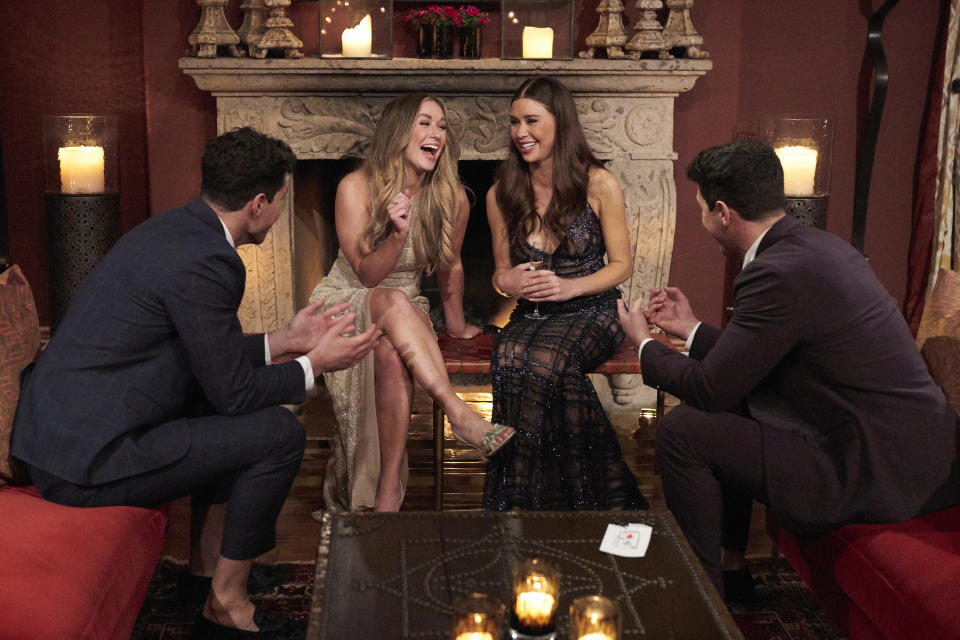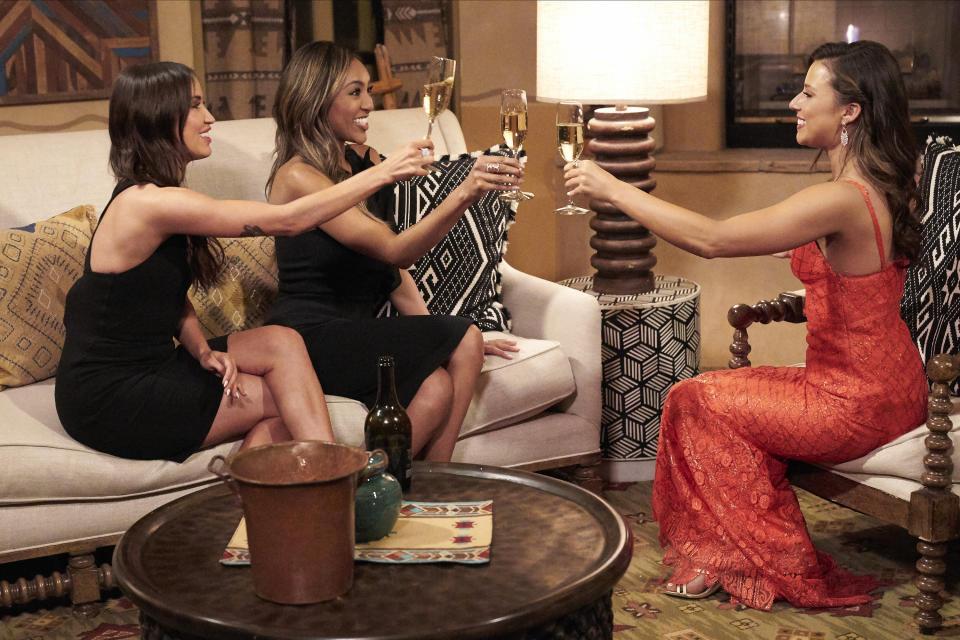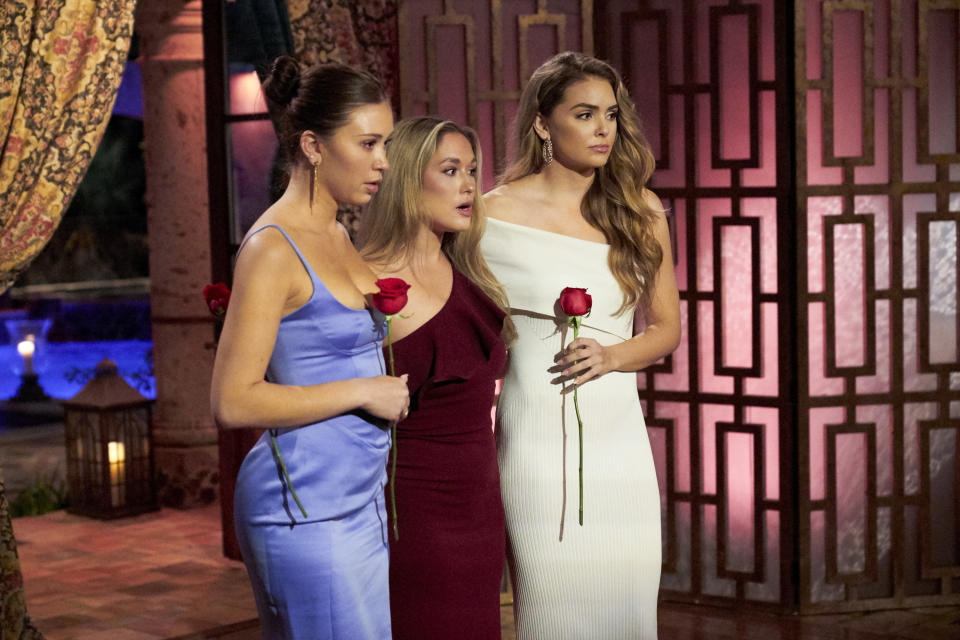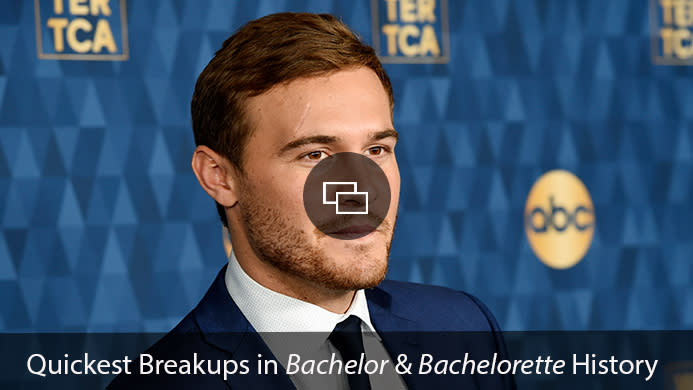Even This Year's 'The Bachelorette' Can't Solve the Show's Big Problem With Female Intimacy

- Oops!Something went wrong.Please try again later.
- Oops!Something went wrong.Please try again later.
- Oops!Something went wrong.Please try again later.
- Oops!Something went wrong.Please try again later.
- Oops!Something went wrong.Please try again later.
On Monday, July 11th, ABC premiered its 19th season of The Bachelorette — only this time, headlining two Bachelorettes in one season. I would make a joke about how this comes at a time when women are not only getting half the air time as their male counterparts but now half the reproductive rights as well, but it’s not so much a joke as just the sad reality we’re faced with.
When ABC first announced last March that both Gabby Windey and Rachel Recchia would be Bachelorette co-leads, I felt a mixture of shock, confusion, and slow-boiling anger. Would the women be competing against each other as was the case in season 11 with Kaitlyn Bristowe and Britt Nilsson? Would it have more of a Paradise feel with rose ceremonies becoming a thing of tequila-and-tears infused anarchy? A mix of both?
More from SheKnows
Watch 'The Bachelorette' on Hulu
$6.99/month (after free trial)
Sign Up
But truthfully, it’s not the format that accounts for most of my animosity going into this season: it’s the promise of female intimacy that I know will be denied.
I should preface this by saying that while I’ve made my professional bones writing recaps of this show, it’s been years since I’ve watched for any purpose other than to horrify my own understanding of the human condition. I don’t believe that love exists in this format. What does exist, or what ABC tries to manufacture into existing, is a certain level of intimacy.
Click here to read the full article.
Intimacy often gets grouped in with ideas of sex, but the term definitionally means “a closeness.” There’s the intimacy between me, the viewer, and the emotional carnage taking place on my screen: Arie telling Becca he wasn’t really in love with her as she worries the Neil Lane monstrosity on her finger; Colton leaping over a fence as Chris Harrison mumbles “what the f**k” in the background; Hannah Brown screaming “Jesus still loves me” as her date slut shames her. There’s the intimacy between contestant and producer, a relationship we witness only during confessional moments. Then there’s the obvious intimacy between contestants and leads, and (the often more compelling) intimacy between the contestants and other contestants.
The show hinges on intimacy, on closeness created throughout, to create compelling storylines. Without it, we’re just watching B-roll of beautiful people in evening wear. So why then, if the Bachelor franchise depends on this intimacy, is it so horribly inept at capturing the intimacy between women?
As a franchise, The Bachelor caters primarily to a female audience. According to a 2020 YouGov study, 77% of its audience is women. The study further shows that 92% of Bachelor viewers consider themselves hopelessly romantic, and a majority of women who watch The Bachelor say they think with their heart more than their head. In short: intimate relationships widely inform Bachelor viewers’ interests, a fact that’s become even more crystallized in how communal the act of watching the show has become. Being a member of Bachelor Nation is an exercise in intimacy more than ever: People watch the show in groups rather than alone, and fans can engage with other fans through podcasts, tweets, meme accounts, Instagram, and other social media. The Bachelor’s continued success relies not on its ratings but on the community it builds online: The intimacy it creates.
And yet, season after season, the franchise fails to fully capture the nuances of feminine intimacy. This is partly due to its creator, Mike Fleiss, having turned the idea of everlasting love into a misogynistic Hunger Games. How can a show that tries to chokehold its audience with super-hetero, evangelical relationships understand the intimacies of women? It’s like the time my friend’s boyfriend walked in on us watching Pen15 and asked us if the main protagonists were lesbians (they’re not; they’re tween best friends). He spent five minutes watching two girls do dumb, adolescent stuff, like discover thongs and practice kissing on their hands, and turned it into something erotic. Not just erotic, but a faux-lesbian erotic, coated in a fine sheen of masculinist fantasy.

ABC/Craig Sjodin.
That is how The Bachelor also treats feminine intimacy. They take girls doing dumb everyday things — cooking shrimp, tanning, drinking on couches — and make it absurd, flat, the kind of thing a caricature of a “hot heterosexual lady” would do. Beyond Mike Fleiss, the execs and producers have broadly failed to consider the needs of their audience in this aspect, incorrectly assuming that the women watching are only interested in watching romantic love and discounting the friendship aspect of the show. This is especially obvious in how they treat women who dare to engage in the most feminine pursuit of all: gossiping.
Notoriously, girls who gossip, whether by the pool or in between glasses of champagne during a cocktail party, are labeled as “drama starters,” and the countdown to their exit becomes glaringly obvious in the edit. The words coming out of their mouths seal their fates as sluts and psychos and mean girls — whatever the narrative calls for. Out of all the missteps it’s possible to make on this “journey,” nothing spells Bachelor Nation doom like the forbidden act of gossiping. Gossiping isn’t always the best and kindest thing to do, but it’s always undeniably a way women bond with one another — and The Bachelor‘s stark painting of it as morally bad feels like yet another way it condemns the bonds between women as unnatural and uninteresting.
The Bachelorette, as the female-led counterpart to The Bachelor, is not immune to this shallow understanding of female intimacy either. The past two seasons of The Bachelorette have introduced female hosts Tayshia Adams and Kaitlyn Bristowe, whose role encompassed that of spirit sister (not unlike if a spirit guide and sorority sister combined their mystic powers for the ultimate advice-giving, safe-space making, YGG-yelling, sexy yet maternal figure). Together, they counseled leads Katie Thurston and Michelle Young on their journeys towards love. While some saw this shift in hosting as a sign of progress for the show, especially coming off the heels of Chris Harrison’s decades-long problematic reign, I’m not sure it progressed anything.

ABC/Craig Sjodin.
Where was the feminine space of kindness and listening and banter and ruthlessness that I grew up on? Why weren’t they getting drunk off mimosas and ranking the men on a scale of “hot” to “he wears cargo pants”? Where were the late-night chats over weird dates or the breaking down, in minute detail, of “this is what he said, what do you think it means?” Instead, Tayshia and Kaitlyn licked their lips at the male contestants, gave half-hearted nods instead of actual advice, and dressed for every date like it was a themed mixer from college. The vibes weren’t as hostile as what happens between women on The Bachelor, but the atmosphere was suspiciously absent of a vibe altogether, a hollow shell of intimacy.
Now that we have co-Bachelorettes, I worry that this new format will result in some unholy mixture of both: shallow, surface-level comradery punctuated by moments of passive-aggressive rage. It’s why I can’t muster up much excitement for the season. I don’t want to see two strong, beautiful, capable women fighting over a man who wears velvet loafers. I don’t want to see Gabby and Rachel pitted against each other or jealous of one another or made insecure. I don’t want to see them exchange fake niceties or hear them recount their dates with redacted-like detail: “he’s so cute” or “we had fun” or “I really like him.”
I want to see Rachel and Gabby talking about guys that give them the ick. I want to hear them dissect the weird comment a guy made about his mother. I want to watch Rachel tell Gabby that this guy reminds her of Gabby’s grandpa. I want to watch Gabby assure Rachel she’s doing the right thing, that her feelings matter. I want to see authentic feminine intimacy as it was promised to me: two best friends on a journey to find love together.
When I think about the soulmates in my own life, I don’t think about men. I think about the platonic feminine relationships that have shaped me. I saw that kind of closeness, that kind of intimacy, during a moment at the end of Clayton’s season. It was right after fantasy suites, during the rose ceremony, when Clayton admitted to Gabby and Rachel that he had slept with and was in love with both of them. I will say nothing of the glee I experienced while watching a grown man so completely implode his whole life, but there was a moment when Gabby comforted Rachel in a way that felt decidedly authentic.

ABC/Craig Sjodin.
“Are you okay?” she asked, pointedly not looking at Clayton, an arm ready to drape around Rachel. In that moment, it wasn’t about the Bachelor or finding love or getting married. It was about comfort, closeness, and solidarity. Gabby’s words may have been asking about her well-being but her eyes were saying “I’m here for you.” Or maybe they were saying “run, bitch, run,” but either way, it was compelling. Despite ABC’s best intentions, it felt real.
The Bachelor franchise might be committed to the narrative of romantic, heterosexual, monogamous love, but what it fails to grasp is the full spectrum of love it could capture. There is a safety we find in other women — a safety that’s been overlooked by reality television, dismissed as boring and “bad content.” This doesn’t mean that I don’t still want to watch Shanae throw a trophy into a bush or Corinne mock a grad student about her emotional intelligence. I still want the chaos and the dramatics, but I also want the kindness and the goofiness and the girliness and the monotonous. Women are more than just drama and manipulation, just like we are more than naivete and hopeless romantics — and an understanding of the complexity of our relationships should be considered in our Bachelor viewing experience. After all, the fanbase is invested in that intimacy. Why should we be denied our version of a happy ending?
Before you go, click here to see the quickest breakups in Bachelor and Bachelorette history.
Best of SheKnows
Everything We Know About Angelina Jolie's Twins, Knox & Vivienne Jolie-Pitt
6 Things Democrats Have Done in Wake of Roe v. Wade Ruling, Ranked From Most to Least Helpful
Drew Barrymore, Mariah Carey, & More Celebrity Moms Who Appeared at Fashion Week 2022
Sign up for SheKnows' Newsletter.
For the latest news, follow us on Facebook, Twitter, and Instagram.


